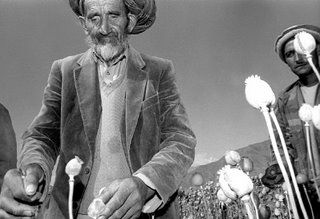 In het kader van de Nederlandse militaire steun aan de democratische opbouw van Afganistan of iets dergelijks wordt er weer flink verdiend aan de heroinehandel.
In het kader van de Nederlandse militaire steun aan de democratische opbouw van Afganistan of iets dergelijks wordt er weer flink verdiend aan de heroinehandel.'War on drugs strengthens Afghan mafia.
By Rachel Morarjee in Kabul.
Afghanistan’s war on drugs has been marred by corruption that has
strengthened the grip of an increasingly powerful mafia on the
country’s narcotics trade, a report by the World Bank and United
Nations said.
Over the past five years, the British-led counter-narcotics strategy
had penalised the country’s poorest farmers and strengthened networks
of organised crime, consolidating the trade among a tiny elite of
traffickers, the damning report said.
"Around 25 to 30 key traffickers, the majority of them based in
southern Afghanistan, control major transactions and transfers,
working closely with sponsors in top government and political
positions."
Afghanistan’s interior ministry, which oversees the police, had been
"captured" by powerful traffickers and was used to facilitate the
drugs trade.
"Those driving the drug industry must be brought to justice and
officials who support it sacked," said Antonio Maria Costa, executive
director of the UN Office of Drugs and Crime.
"Interdiction efforts especially need to target high-level profiteers
whose wealth magnifies their potential for corrupting the state," the
report said.
Strategies aimed at short-term reductions in opium production in the
worst affected areas could do more harm than good, fuelling
"discontent and strengthening the insurgency in the volatile south of
the country".
Far from leading to sustained declines in total national cultivation,
a successful reduction in one province often led to increases
elsewhere, or cultivation in the province itself rebounded the
following year, such as in Helmand province after 2003.
To achieve long-term success in the battle against drugs eradication,
the report found that efforts should be concentrated in the six
Afghan provinces where there was relatively little opium cultivation
to build up a line of defence against the spread of the trade. "Rural
development programmes are needed throughout the country and should
not be focused primarily on opium areas, to help prevent cultivation
from further spreading," said Alastair McKechnie, World Bank country
director for Afghanistan.
Efforts to eradicate opium crops had strengthened corruption by
giving police an opportunity to collect bribes, which hit hardest the
poor farmers and labourers who could not afford to pay off authorities.
"Wealthier opium producers pay bribes to avoid having their crops
eradicated, greatly reducing the effectiveness of counter-narcotics
measures and gravely undermining the credibility of the government
and its local representatives," the report said.
Afghanistan produced a record opium harvest in 2006, with total
cultivation increasing by 59 per cent and production by 49 per cent.
The bulk of opium growth this year was concentrated in Helmand and a
few other highly insecure and insurgency-ridden provinces in the south.
Even in this record year, opium took up less than 4 per cent of the
total cultivated area in Afghanistan, with only an estimated 13 per
cent of the population involved in poppy cultivation, which the
report said was cause for hope.'
Zou de minister van Defensie, de oud-wethouder van Borculo Henk Kamp, dit allemaal beseffen of is hij nog naiever dan algemeen wordt aangenomen.


Geen opmerkingen:
Een reactie posten